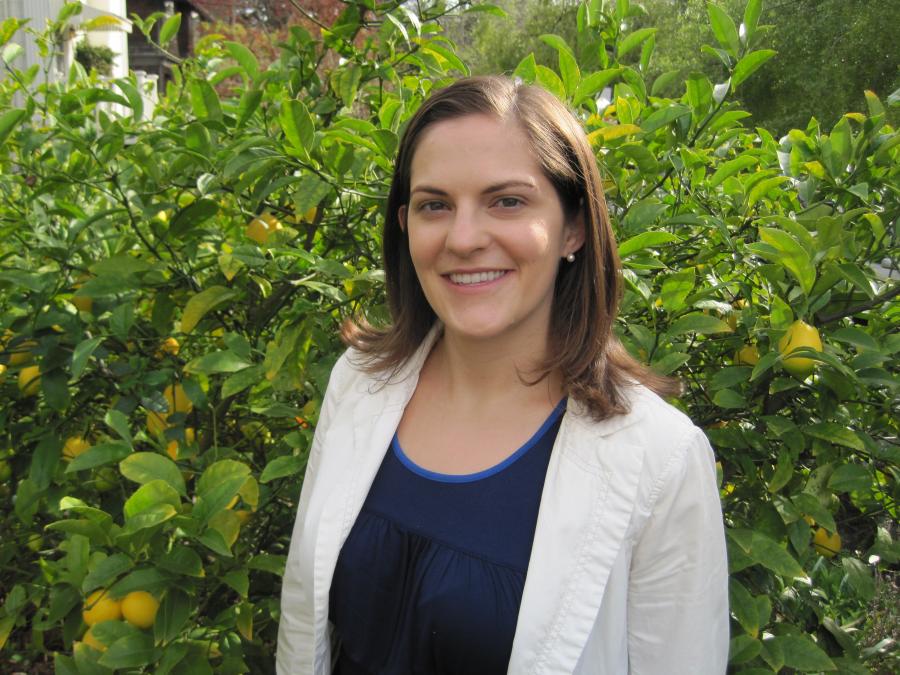Faculty Spotlight: Virginia Lewis

Florida State University Department of Classics director of graduate studies and associate professor Virginia Lewis. Photo courtesy Sarah Titus.
Virginia Lewis is an associate professor in the Department of Classics, part of the College of Arts and Sciences. Lewis has been teaching both undergraduate and graduate courses at Florida State for seven years and serves as the director of graduate studies for the Department of Classics. She earned her bachelor’s degree from University of Pennsylvania, her master’s degree from University of Georgia, and her doctorate from the University of California Berkeley.
Tell us a little about your background.
I grew up in Pittsburgh, and pursued my undergraduate degree at the University of Pennsylvania. I didn’t study Greek and Latin until later in college, so I also stayed for a post-baccalaureate year to work on my languages. I completed my master’s degree in 2007 and my doctorate in 2014, and joined the faculty at FSU directly following graduate school.
When did you first become interested in Greek literature?
When I first arrived at college, I planned on majoring in English literature. However, I took a course called “Homer and Joyce,” in which we read and discussed the Greek epic poem “The Odyssey” and the 20th century novel “Ulysses” with two professors who were experts on the authors. I was surprised to find the stories so relevant to my own experience, so I began studying Ancient Greek as a side project — just enough to read the “The Odyssey” without an English translation — while pursuing English literature. I soon realized my love for classics because it allowed me to study language, linguistics, and literature alongside history and material culture, and I decided to shift my academic path.
What are your current research interests and what makes you passionate about them?
My current research focuses on how Greek poets reinforced and shaped identities in the fifth century BCE. My first book, “Myth, Locality, and Identity in Pindar’s Sicilian Odes,” centers on odes written by the lyric poet Pindar that celebrated the victories of Sicilian athletes in events such as the Olympic games. I argue that the performances of this poetry created an identity for Sicilian Greeks and newly-arrived immigrant citizens by weaving traditional Greek myths into the Sicilian landscape.
My second area of research examines gender differences in Greek tragedies by comparing the speech preferences of male and female speakers. For example, male and female speakers in Greek tragedy tend to choose different phrases to express surprise, joy and lamentation. The project proposes that the gendered speech preferences of Greek tragedies were both subtle and pervasive, and identifying these differences offers us a new way of understanding gender identity in well-known Greek texts.
What do you want the public to know about your research? Why is your topic important?
Performances of Greek tragedy and poetry were some of the most engaging forms of entertainment available for Greeks in the fifth century BCE. Performances would take place at public festivals that included eating, drinking and religious ceremonies. By studying the ways these performances both reinforced and shaped the values of past audience members, we can identify and think critically about how literature and entertainment shape cultural values in the 21st century.
Who are your role models? Who has influenced you most in your life?
My grandfather was an important role model. He taught me the value of hard work and intellectual curiosity, gardening and cooking. He also regularly asked me why I was studying French instead of Latin in high school, and I like to think he would be proud of the career path I have chosen.
How has COVID-19 impacted your research and your role as a professor?
It’s difficult to summarize the impacts. I have been more fortunate than others during the pandemic, but it was certainly disappointing last spring when conferences were canceled and some publications experienced delays. Nevertheless, I am grateful for the invitations to give virtual talks at other universities and attend conferences over Zoom during this time. I am also grateful for my students who are making the best of a difficult situation. As director of graduate studies during COVID-19, I am particularly impressed by the master’s and doctoral students within the classics department who are persevering in their teaching, coursework and research.
What brought you to Florida State University? Why do you enjoy working at FSU?
I was excited to come to Florida State University because of the classics department’s longstanding dedication to interdisciplinary teaching and research. I enjoy working at FSU because I have fantastic colleagues and students.
What is your favorite part of your job? What is the most challenging part of your job?
My favorite part of my job is working with students both in the classroom and as an adviser. It’s exciting when I get to share my research interests and methods with undergraduate and doctoral students and help them develop their own. I always learn as much from my students as they do from me. The most challenging part of my job is the weight of responsibility in teaching and advising students.
How do you like to spend your free time?
I enjoy cooking and exploring the trails in Tallahassee with my dogs.
If your students only learned one thing from you (of course, hopefully they learn much more than that), what would you hope it to be?
When advising students, I always emphasize one of the Delphic Maxims inscribed onto the Temple of Apollo in Delphi: “Know yourself.”
